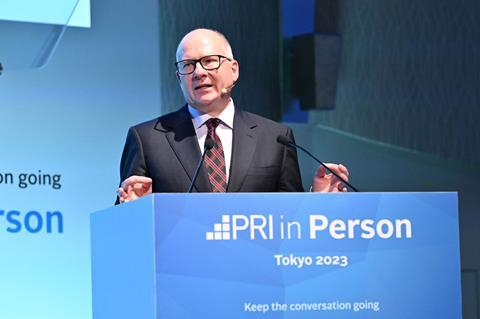By David Atkin, CEO, Principles for Responsible Investment

In October 2023, almost 1,400 investment professionals from around the world gathered in Tokyo for PRI in Person. As I reflected on the wide-ranging discussions, one theme consistently emerged as a barrier for investors seeking to embrace our conference theme, ‘moving from commitments to action’ – namely, a shortage of the organisation-wide ESG fluency required to take their responsible investment (RI) practices to the next level.
What is the ESG skill gap?
Growing client demand, greater regulatory scrutiny, new reporting requirements, and the increased recognition of the financial materiality of ESG factors have driven RI into the mainstream.
The rapid rise of RI has created a soaring demand for ESG skills. Over 80% of asset owners globally are now implementing sustainable investment strategies. Yet the supply of these skills continues to lag; over three quarters of financial professionals report a sustainability skills shortage at their organisation. This major deficit of ESG knowledge among financial professionals acts to significantly slow the incorporation of responsible investment strategies at an organisational level and, in aggregate, industry wide.
The ESG space has developed so quickly in the past few years. This is a challenge for a lot of organisations in terms of growing in sophistication, in terms of incorporating ESG holistically across the whole organisation. That’s the challenge we have seen, and the ESG skills gap is likely to be one of the major bottlenecks.
Xinting Jia, ESG Investment Strategist, State Street Global Advisors (at PRI in Person 2023)
Internal training and ESG performance
New academic research demonstrates that the provision of internal ESG training is the single most robust predictor of a long-term public commitment to sustainable investment.
PRI Research Fellow, Yuxia Zou, found that based on PRI Responsible Investment Transparency Reports between 2014-2020, institutional investors that maintained their PRI signatory status consistently provided more ESG training for all internal roles compared to institutional investors that delisted from PRI for reasons other than merger, acquisition, or liquidation.
Among various responsible investment strategy and governance indicators, improvement in training is the most statistically significant factor to prolong an institutional investor’s PRI signatory status, which we can read as a proxy indicator for an institutional investor’s public commitment to sustainable investment. Alongside the individual accountability of ESG department heads and the internal assurance of ESG disclosures, ESG training emerges as one of the three most robust indicators that are associated with the likelihood of upholding a public commitment to sustainable investment.
When we are doing due diligence for our external managers, we ask about their training process, and we want to know who’s receiving education, on what topics, and how often. The rationale behind this is to understand how fluent the investment team is, as well as how fluent other teams are, and we want to understand how systematic that process is.
Maria Clara Rendon, Director, Responsible Investing, University Pension Plan Ontario (at PRI in Person 2023)
Investor education
As responsible investment has moved from niche concern to mainstream practice over recent years, for investment organisations, keeping pace with this fundamental industry shift means that ESG expertise can no longer be confined to specialist teams.
Traditionally, ESG skills have been concentrated in specialist teams responsible for creating, executing, managing and administering their organisation’s RI strategies and policies. However, recent PRI research demonstrates that to maximise the benefits of an ESG strategy, everyone in an investment organisation – whether in a front, middle or back-office role – requires some level of understanding of responsible investment principles, and how those principles are interpreted within their ESG investing and sustainability policies.
If you think about responsible investing today, it really matters to everyone. If it’s the IT people, the systems we’re building up today need to be ready. If it’s the salespeople, they need to be fluent in speaking the language of ESG. Of course, all the investment people and compliance. So, in the end, the whole organisation must take part. That’s why we decided to roll training out across the organisation.
Hanna Edstroem, Head ESG Liquid Markets, LGT Capital Partners (at PRI in Person 2023)
The PRI offers a range of ESG courses to help investors bridge their ESG skills gap and progress their responsible investment practices. Access a free course demo or find out more at the PRI Academy website.
One of the PRI’s core objectives, as set out in our mission statement, is to ‘address obstacles to a sustainable financial system’. It is becoming increasingly clear that the industry-wide lack of ESG understanding is one such obstacle. As mentioned above, ESG skills are not for ESG teams alone. To empower and operationalise a truly sustainable financial system, it has become essential that all investment professionals – at every level and in every function – must be fluent in the language of ESG.
At the PRI, we are pleased to support training efforts in pursuit of this goal. To return to the theme of PRI in Person, it has never been more urgent that we translate our sustainability commitments into ambitious, impactful action. To access training support that can help you get there, I encourage you to have an exploratory conversation with our PRI Academy and find out more.













